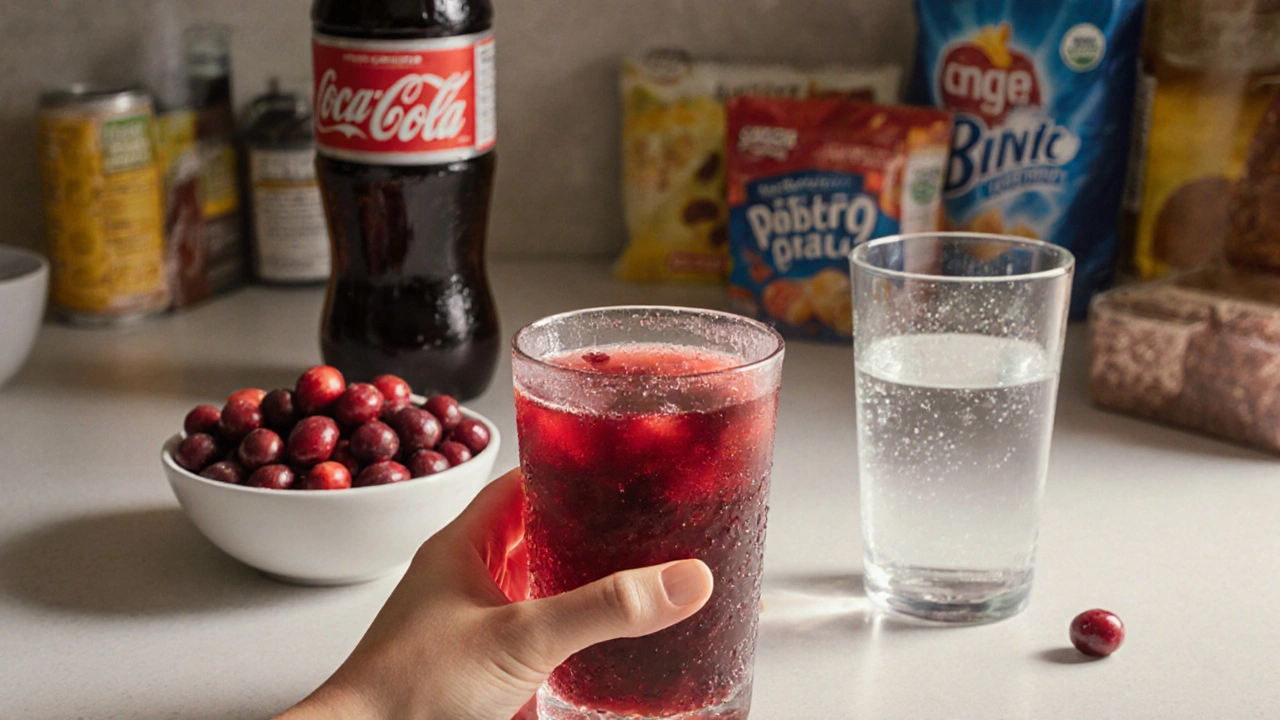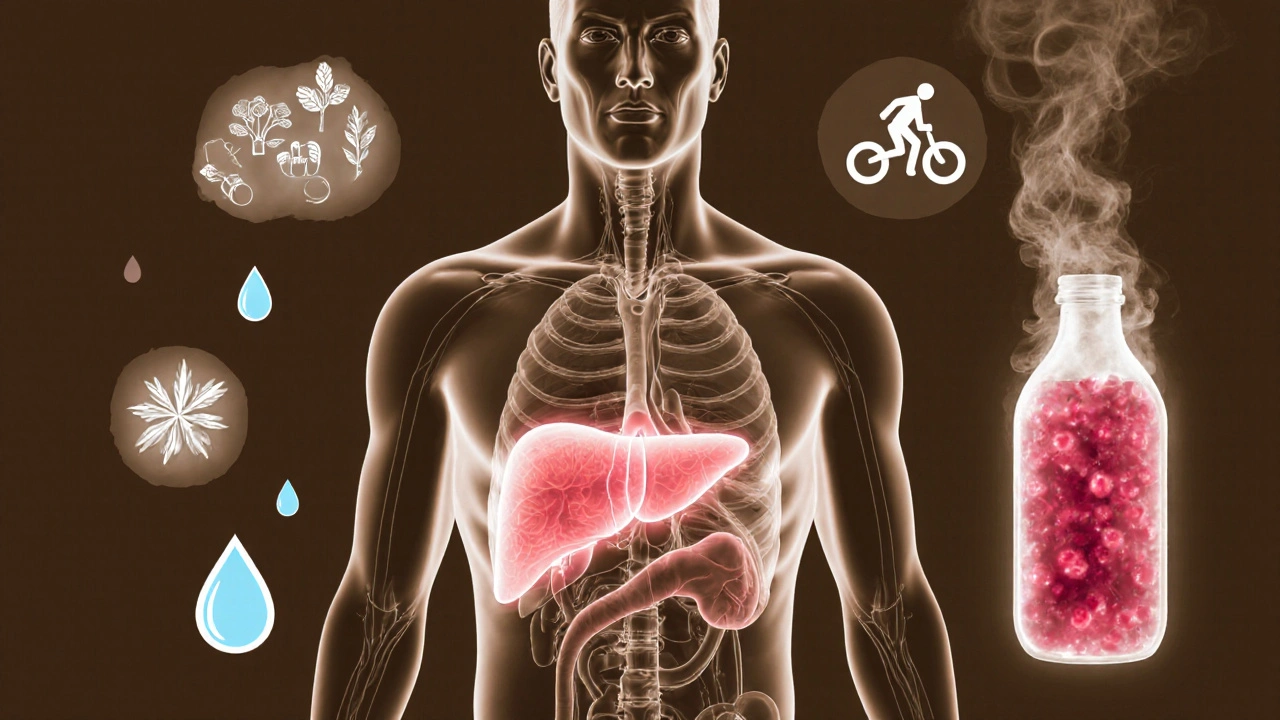
People swear by cranberry juice as a detox drink. You’ve probably seen it on social media - glowing reviews, before-and-after photos, influencers calling it a "natural cleanse" that flushes out toxins. But here’s the truth: cranberry juice isn’t a detox. And if you’re counting on it to clean out your system, you’re misinformed.
What Does "Detox" Even Mean?
The word "detox" is everywhere - in teas, powders, juice cleanses, and even spa packages. But outside of medical settings, it’s mostly marketing. Your body doesn’t need help detoxing. Your liver, kidneys, lungs, and skin do that job every single day, all on their own. They filter out alcohol, heavy metals, processed food byproducts, and environmental pollutants without you needing to drink anything special. When someone says "I did a detox and I feel better," they’re usually feeling better because they stopped eating junk food, drank more water, and got more sleep. Not because some juice magically pulled toxins out of their cells.What’s Actually in Cranberry Juice?
Cranberries are packed with antioxidants, especially proanthocyanidins (PACs). These compounds help prevent bacteria from sticking to the walls of your urinary tract - that’s why cranberry juice is often recommended for urinary health. A 2023 review in the Journal of Nutrition confirmed that regular consumption of unsweetened cranberry juice reduces the risk of recurrent UTIs in women by about 35%. But antioxidants ≠ detox. Antioxidants fight free radicals, which can damage cells over time. That’s good for long-term health, but it’s not the same as flushing out toxins like a pressure washer cleaning a driveway. Most store-bought cranberry juice? It’s mostly sugar and water. A single 8-ounce glass can have 30 grams of added sugar - more than a can of soda. That sugar spike can actually stress your liver, not help it. If you want real benefits, choose 100% unsweetened cranberry juice, or better yet, eat whole cranberries. They have fiber, which helps your gut and liver work better.Cranberry Juice and the Liver: What the Research Says
The liver is your body’s main detox organ. It breaks down alcohol, medications, and environmental chemicals. Some animal studies have looked at cranberry extract and liver health. One 2021 study on rats with fatty liver disease showed that cranberry polyphenols reduced fat buildup and inflammation. But rats aren’t humans. And the doses used were far higher than what you’d get from drinking juice. No human clinical trial has shown that cranberry juice improves liver function or helps remove toxins from the liver. If you have liver disease, or you’re trying to support liver health, focus on proven methods: cut back on alcohol, avoid processed foods, get regular exercise, and manage your weight. Cranberry juice won’t fix a damaged liver.
Why Do People Think It’s a Detox?
There are a few reasons this myth sticks around. First, cranberry juice makes you pee more. That’s because it’s mostly water, and it has mild diuretic properties. When you urinate more, you might feel like you’re "flushing out" toxins. But you’re just losing water - not fat, not heavy metals, not chemicals. Second, cranberry juice has a tart taste. People associate tartness with "cleaning" or "purifying." That’s psychological, not scientific. Lemon water doesn’t detox your body either - it just tastes sharp. Third, it’s trendy. Social media thrives on quick fixes. "Drink this juice for 7 days and lose 5 pounds!" - it sounds simple. But weight loss from juice cleanses? That’s mostly water weight and muscle loss. It comes right back once you eat normally again.Who Should Drink Cranberry Juice?
Not because it detoxes - but because it helps with specific, real problems.- Women with recurrent urinary tract infections (UTIs) - unsweetened cranberry juice can help prevent them.
- People looking to boost antioxidant intake - it’s a good source of vitamin C and flavonoids.
- Those who need to reduce sugar intake - swapping soda for unsweetened cranberry juice (diluted with water) is a smart swap.

What Actually Works for Detoxing Your Body?
Forget juice cleanses. Here’s what science says supports your body’s natural detox systems:- Drink plenty of water - your kidneys need it to filter waste.
- Eat fiber-rich foods - broccoli, oats, beans, and apples help move toxins through your gut.
- Get enough sleep - your brain clears waste chemicals while you rest.
- Exercise regularly - it boosts circulation and helps your liver and kidneys work better.
- Limit alcohol, processed foods, and added sugar - these are the real toxins you should reduce.
Bottom Line: Is Cranberry Juice a Good Detox?
No. It’s not a detox. But it’s not useless either. If you enjoy the taste and drink it unsweetened, it can be part of a healthy diet. It helps your urinary tract. It gives you antioxidants. It’s better than soda. But if you think it’s cleaning out your liver, flushing out toxins, or resetting your body - you’re buying into a myth. Your body is already doing that, perfectly, every day. Stop spending money on detox juices. Start spending it on real food - vegetables, whole grains, lean proteins, and water. That’s the only detox that actually works.Does cranberry juice clean your liver?
No, cranberry juice does not clean your liver. Your liver naturally detoxifies your body using enzymes and bile. While cranberry juice contains antioxidants that may reduce inflammation, there’s no evidence it enhances liver function or removes toxins. Studies showing benefits were done on concentrated extracts in animals, not on human juice consumption.
Can cranberry juice help with weight loss?
Cranberry juice alone won’t help you lose weight. Most commercial brands are high in sugar, which can lead to weight gain. Even unsweetened cranberry juice has natural sugars and calories. Weight loss comes from a calorie deficit, not from drinking a specific juice. Replacing sugary drinks with water or unsweetened cranberry juice might help slightly, but it’s not a weight-loss tool.
Is it safe to drink cranberry juice every day?
Yes, for most people, drinking 1 cup of unsweetened cranberry juice daily is safe and can support urinary health. But if you’re on blood thinners like warfarin, have a history of kidney stones (cranberries contain oxalates), or have diabetes, talk to your doctor first. Too much can cause stomach upset or interact with medications.
What’s better than cranberry juice for detoxing?
There’s no need for a "detox" - your body handles it naturally. But if you want to support your liver and kidneys, focus on hydration, fiber-rich foods (like broccoli and lentils), regular movement, and avoiding alcohol and ultra-processed foods. These are proven, science-backed ways to keep your detox systems running smoothly.
Does cranberry juice help with kidney stones?
It might increase your risk. Cranberries are high in oxalate, a compound that can contribute to calcium oxalate kidney stones - the most common type. If you’ve had kidney stones before, drinking large amounts of cranberry juice could make them more likely to return. Talk to your doctor before making it a daily habit.
If you’re looking for real, lasting health improvements, stop chasing quick fixes. Start eating whole foods, moving your body, and drinking water. That’s the only detox that lasts.


15 Comments
Cranberry juice isn't a detox, but it's not useless either. The science on UTI prevention is solid, and swapping soda for unsweetened juice is a win. No magic, just smart choices.
It's fascinating how deeply embedded the detox myth is in our cultural psyche - as if our bodies are broken machines that require artisanal elixirs to function. The liver, a marvel of evolutionary engineering, processes over 500 substances daily without fanfare, yet we're sold bottled tartness as a panacea. The psychological allure of the ‘cleanse’ speaks more to our desire for control in an unpredictable world than to any physiological reality. And yet, the reductionist marketing of ‘detox’ persists because it’s profitable, not because it’s plausible. The real detox? Sleep. Movement. Whole foods. Water. Not juice.
Yeah man, I used to drink the sugary stuff thinking it was healthy. Then I switched to unsweetened and diluted it with sparkling water. Tastes like a sour lemonade but now I actually feel better. No magic, just less sugar. Also, my UTIs stopped coming back.
Let me be perfectly clear: if you believe in detox juices, you’re not just misinformed-you’re complicit in a billion-dollar scam that preys on people’s fear of their own biology. The body doesn’t need your juice. It needs your discipline. Stop buying into the lie.
I get why people love cranberry juice. It’s tart, it’s red, it feels like it’s doing something. But honestly, I just drink it because it reminds me of Thanksgiving. No detox claims, just good memories and a little bit of vitamin C.
Correction: the 2023 review in the Journal of Nutrition did NOT confirm a 35% reduction in UTIs - it said ‘up to’ 35% in specific subgroups. Also, you misspelled ‘proanthocyanidins’ as ‘PACs’ without defining it. This post is sloppy.
im just here for the cranberry juice but also the liver thing made me think about how we treat our bodies like cars that need a tune up lmao we just need sleep food and water and we’re good to go
The system is designed to keep you dependent on ‘solutions’ - the pharmaceutical-industrial complex, the wellness-industrial complex, the juice-industrial complex. They don’t want you to know your body is self-sustaining. They want you buying, consuming, believing. Cranberry juice? A placebo with a price tag. Wake up.
People still believe this? After all the science? You’re not detoxing. You’re just peeing more. And if you’re diabetic and drinking this stuff, you’re just giving your pancreas a heart attack. Stop.
USA invented the science behind this. Other countries still believe in magic potions. We know better. Drink water. Eat meat. Stop drinking sugar water pretending it’s medicine.
What’s interesting is not whether cranberry juice works - but why we’re so desperate to believe that something simple can fix something complex. We don’t want to hear that health is daily habits. We want a ritual. A symbol. A drink. The real detox is accepting that healing isn’t a product - it’s a practice.
They’re hiding the truth. Cranberry juice was used by the military to counteract chemical weapons in the 70s. That’s why they turned it into a wellness trend. To distract you from the real toxins in your food and water. The government doesn’t want you to know this.
Oh sweetie, I’ve been drinking organic, cold-pressed, hand-harvested cranberry elixir since I did my Ayurvedic cleanse in Bali last spring - and my aura has never been clearer. Honestly, if you’re still drinking store-bought juice, you’re not even in the conversation. Your cells are weeping.
They call it detox but its just water with sugar and a placebo effect. The real detox is silence. The real cleanse is not buying into the lie. Your liver doesn’t care about your juice. It cares about your silence. Your stillness. Your refusal to participate in the scam.
so i drank cranberry juice for 3 days and i felt better so it works lol